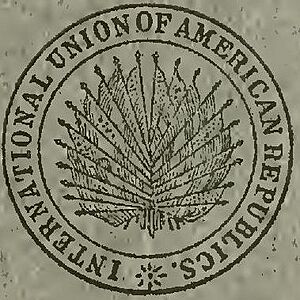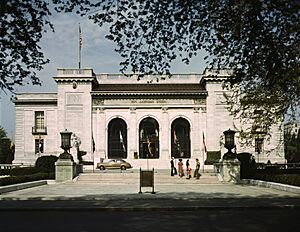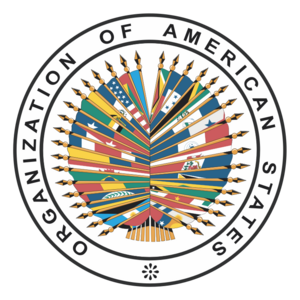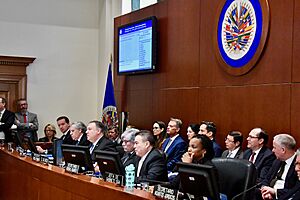Organization of American States facts for kids
Quick facts for kids
Organization of American States
|
|||||||||
|---|---|---|---|---|---|---|---|---|---|
|
Motto:
"Democracy for peace, security and development" |
|||||||||
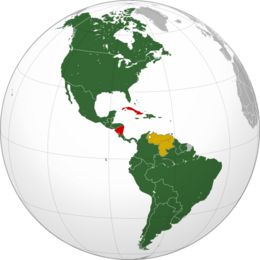
The OAS as of 2022 Member states Former member states Disputed member states
|
|||||||||
| Headquarters | 17th Street and Constitution Avenue NW, Washington, D.C., U.S. 38°53′34″N 77°02′25″W / 38.8929138°N 77.0403734°W |
||||||||
| Official languages | English French Portuguese Spanish |
||||||||
| Member states |
33 states
Antigua and Barbuda
Argentina Bahamas Barbados Belize Bolivia Brazil Canada Chile Colombia Costa Rica Dominica Dominican Republic Ecuador El Salvador Grenada Guatemala Guyana Haiti Honduras Jamaica Mexico Panama Paraguay Peru Saint Kitts and Nevis Saint Lucia Saint Vincent and the Grenadines Suriname Trinidad and Tobago United States Uruguay Venezuela (Disputed) |
||||||||
| Leaders | |||||||||
|
• Assistant Secretary General
|
|||||||||
| Establishment | |||||||||
|
• Charter
|
30 April 1948 | ||||||||
| Area | |||||||||
|
• Total
|
40,275,678 km2 (15,550,526 sq mi) | ||||||||
| Population | |||||||||
|
• 2023 estimate
|
1,028,404,247 | ||||||||
| Time zone | UTC−10 to +0 | ||||||||
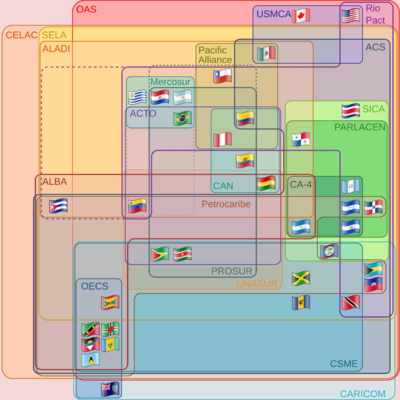
The Organization of American States, also known as the OAS, is a group of countries from the Americas. It was created on April 30, 1948. Its main purpose is to help its member countries work together. The group's headquarters is in Washington, D.C.
The OAS focuses on important issues like protecting human rights and making sure elections are fair. It also helps countries grow their economies and works to keep the Americas safe. Currently, 33 countries are members of the OAS.
The leader of the OAS is called the Secretary General. In May 2025, Albert Ramdin from Suriname became the Secretary General.
Contents
History of the OAS
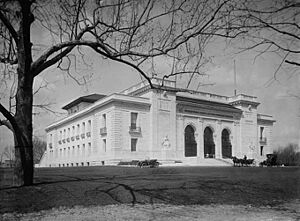
Early Ideas for Unity
The idea of countries in the Americas working together is very old. In the 1820s, leaders like Simón Bolívar wanted to create a league of American republics. They imagined countries having a shared military and a pact to defend each other. However, this dream did not come true at the time because many new countries were focused on their own national issues.
The idea came back in 1889. At a conference in Washington, D.C., 18 nations decided to create the International Union of American Republics. This was the real beginning of the OAS. They started on April 14, 1890.
Becoming the OAS
In 1910, the group changed its name to the Union of American Republics. Its main office was the Pan American Union in Washington, D.C.
After World War II, countries in the Americas realized they needed to work together for security. They signed the Rio Treaty in 1947. This treaty was a promise of collective security, meaning they would help protect each other from attacks.
The OAS as we know it today was officially born on April 30, 1948. At a conference in Bogotá, Colombia, 21 countries signed the Charter of the Organization of American States. This charter laid out the rules and goals of the new organization.
Recent Events
The OAS often sends teams to watch elections in member countries to make sure they are fair. In 2019, the OAS observed an election in Bolivia and reported that there were serious problems. This led to a political crisis in the country.
The OAS has also faced disagreements with some member countries. In 2022, Nicaragua announced it was leaving the OAS, and the process was completed in 2023. Venezuela also started the process of leaving in 2017 due to disagreements with the organization.
Key Moments in OAS History
- 1959: The Inter-American Commission on Human Rights was created to protect people's rights.
- 1962: The OAS suspended Cuba's government from participating.
- 1969: The American Convention on Human Rights was signed. This is an important treaty for protecting human rights.
- 1991: The OAS passed a rule to react quickly if a government in a member country was overthrown.
- 2001: The Inter-American Democratic Charter was adopted. It states that all member countries must be democracies.
- 2009: The OAS lifted the 1962 suspension of Cuba.
- 2009: The OAS suspended Honduras after its president was removed from office. The suspension was lifted in 2011.
- 2019: The OAS recognized a new representative from Venezuela during its presidential crisis.
- 2023: Nicaragua completed its withdrawal from the OAS.
What the OAS Tries to Achieve
The main goal of the OAS is to create peace and justice in the Americas. It also aims to help its members work together and protect their independence. The OAS has eight main purposes:
- To make peace and security stronger on the continent.
- To support democracy.
- To help settle disagreements between member countries peacefully.
- To plan for joint action if a country is attacked.
- To find solutions to political and economic problems.
- To help countries develop their economies and cultures.
- To end extreme poverty.
- To limit the number of weapons so more money can be spent on development.
How the OAS is Organized
The OAS has several main parts that work together. These include the General Secretariat, the Permanent Council, and other committees and commissions that focus on specific issues like human rights and security.
The General Assembly
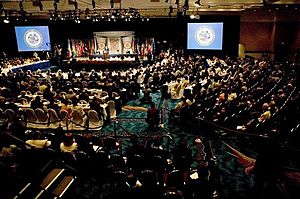
The General Assembly is the most powerful body in the OAS. It meets once a year to make big decisions. It sets the policies for the organization, approves the budget, and elects members for different OAS agencies. Each member country gets one vote.
Official Languages
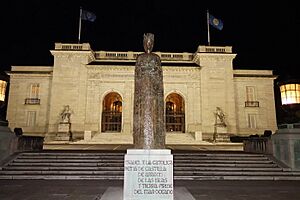
The OAS has four official languages: English, Spanish, Portuguese, and French. This means that meetings and official documents are available in all four languages. This helps representatives from all member countries communicate effectively.
Who Can Join the OAS?
When the OAS was founded in 1948, it had 21 members, mostly from Latin America. Over the years, other countries joined, including Canada and newly independent nations in the Caribbean.
Some of the countries that joined later include:
Countries That Have Left or Been Suspended
Cuba
In 1962, the government of Cuba was suspended from the OAS. The OAS stated that Cuba's government was not compatible with the organization's principles. For many years, Cuba could not participate in meetings or activities.
In 2009, the OAS voted to lift the suspension. This meant Cuba could ask to be readmitted. However, the Cuban government stated that it did not want to return to the OAS.
Honduras
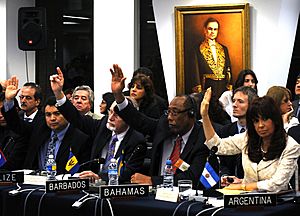
In 2009, the president of Honduras, Manuel Zelaya, was removed from power. Because of this, the OAS suspended Honduras's membership. This was the first suspension since Cuba's in 1962. After President Zelaya returned to the country in 2011, Honduras was allowed back into the OAS.
Nicaragua
In 2021, the OAS criticized the general election in Nicaragua. In response, Nicaragua announced it would leave the organization. The process was officially completed in November 2023.
Venezuela
In 2017, Venezuela announced it would leave the OAS because of disagreements over a political crisis in the country. In 2019, during a presidential crisis, a new representative for Venezuela was recognized by the OAS. The situation regarding Venezuela's membership remains complex.
See also
 In Spanish: Organización de los Estados Americanos para niños
In Spanish: Organización de los Estados Americanos para niños
- African Union
- Community of Latin American and Caribbean States
- European Union
- Flag of the Organization of American States
- Organization of Ibero-American States
- Regional integration
- Rio Group
- Rio Pact
- Statues of the Liberators
- Union of South American Nations
 | Misty Copeland |
 | Raven Wilkinson |
 | Debra Austin |
 | Aesha Ash |




